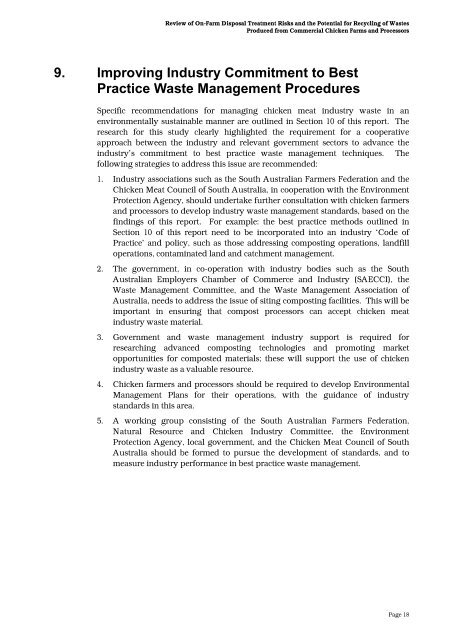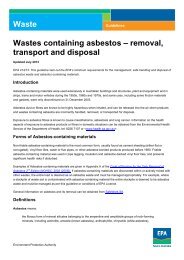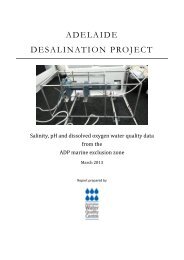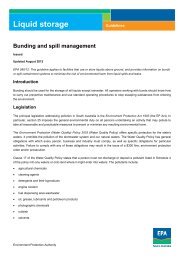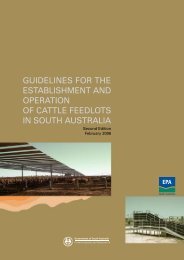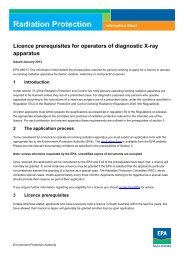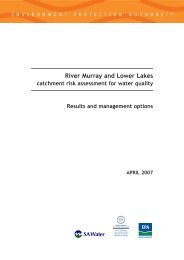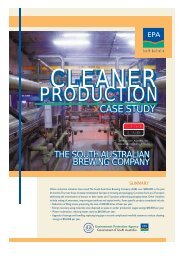Commercial Chicken Farms and Processors - EPA
Commercial Chicken Farms and Processors - EPA
Commercial Chicken Farms and Processors - EPA
You also want an ePaper? Increase the reach of your titles
YUMPU automatically turns print PDFs into web optimized ePapers that Google loves.
Review of On-Farm Disposal Treatment Risks <strong>and</strong> the Potential for Recycling of Wastes<br />
Produced from <strong>Commercial</strong> <strong>Chicken</strong> <strong>Farms</strong> <strong>and</strong> <strong>Processors</strong><br />
9. Improving Industry Commitment to Best<br />
Practice Waste Management Procedures<br />
Specific recommendations for managing chicken meat industry waste in an<br />
environmentally sustainable manner are outlined in Section 10 of this report. The<br />
research for this study clearly highlighted the requirement for a cooperative<br />
approach between the industry <strong>and</strong> relevant government sectors to advance the<br />
industry’s commitment to best practice waste management techniques. The<br />
following strategies to address this issue are recommended:<br />
1. Industry associations such as the South Australian Farmers Federation <strong>and</strong> the<br />
<strong>Chicken</strong> Meat Council of South Australia, in cooperation with the Environment<br />
Protection Agency, should undertake further consultation with chicken farmers<br />
<strong>and</strong> processors to develop industry waste management st<strong>and</strong>ards, based on the<br />
findings of this report. For example: the best practice methods outlined in<br />
Section 10 of this report need to be incorporated into an industry ‘Code of<br />
Practice’ <strong>and</strong> policy, such as those addressing composting operations, l<strong>and</strong>fill<br />
operations, contaminated l<strong>and</strong> <strong>and</strong> catchment management.<br />
2. The government, in co-operation with industry bodies such as the South<br />
Australian Employers Chamber of Commerce <strong>and</strong> Industry (SAECCI), the<br />
Waste Management Committee, <strong>and</strong> the Waste Management Association of<br />
Australia, needs to address the issue of siting composting facilities. This will be<br />
important in ensuring that compost processors can accept chicken meat<br />
industry waste material.<br />
3. Government <strong>and</strong> waste management industry support is required for<br />
researching advanced composting technologies <strong>and</strong> promoting market<br />
opportunities for composted materials; these will support the use of chicken<br />
industry waste as a valuable resource.<br />
4. <strong>Chicken</strong> farmers <strong>and</strong> processors should be required to develop Environmental<br />
Management Plans for their operations, with the guidance of industry<br />
st<strong>and</strong>ards in this area.<br />
5. A working group consisting of the South Australian Farmers Federation,<br />
Natural Resource <strong>and</strong> <strong>Chicken</strong> Industry Committee, the Environment<br />
Protection Agency, local government, <strong>and</strong> the <strong>Chicken</strong> Meat Council of South<br />
Australia should be formed to pursue the development of st<strong>and</strong>ards, <strong>and</strong> to<br />
measure industry performance in best practice waste management.<br />
Page 18


